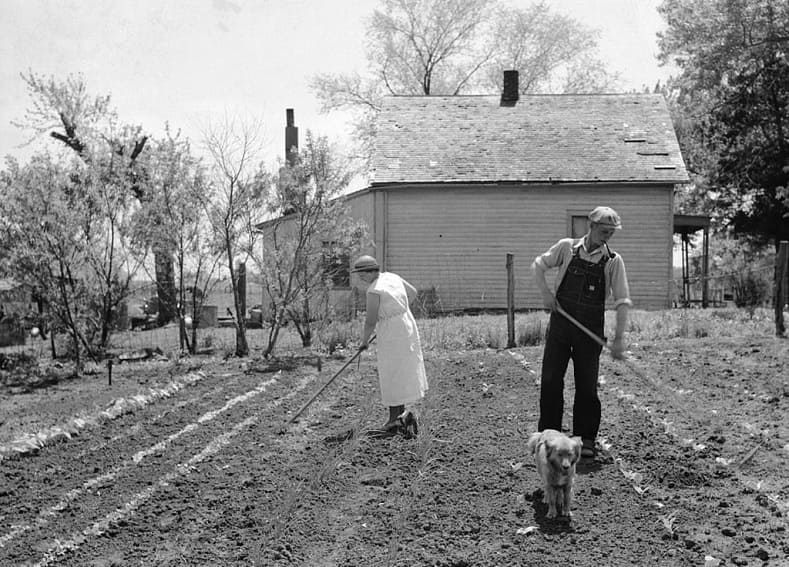A memoir as written by Clyde Finch, A Gardener’s Memoir from the Great Depression Era
August of 1934 marked a challenging period for everyone, as the Great Depression had taken its toll. In those trying times, I, Clyde Finch, sought solace and satisfaction in cultivating my food, finding respite in the nurturing embrace of the soil.
While that August’s scorching heat and dryness were not as severe as those in Oklahoma, water was rationed to prevent depleting our well.
Fortunately, our well, located at a lower elevation, granted us four gallons of water per hour. It was a modest provision, enough to meet our needs but never taken for granted.
Residing on the outskirts of Greenfield, Indiana, in a small farming community, I faced the daily challenge of making ends meet. The scarcity of work opportunities and the time required to travel to the city posed additional hurdles.
However, our local farmers’ co-op extended support by providing seeds to cultivate our garden, allowing us to grow the essential crops our family cherished.
Guided by my father, I learned the art of seed preservation, and we all embraced the responsibility of saving seeds to ensure a sufficient supply for those in need. Mastery in gardening is a gradual process that takes time and perseverance.
Before the sun graced the sky each morning, I eagerly embarked on my chores. Tending to the chickens, milking our cherished cow, and nurturing my garden became the day’s initial rituals.
Amongst all the farm tasks, I developed a deep fondness for the garden. Its tranquility, the rich aroma, and the gentle absence of scorching sunlight made it a cherished sanctuary.
With unwavering dedication, I diligently planted, weeded, and harvested various vegetables: luscious tomatoes, crisp cucumbers, vibrant peppers, and hearty squash.
Additionally, I took great pride in a small plot of corn, which garnered compliments from our neighbor, Jane Sutherland.
From her porch, she often exclaimed, “I swear your corn grew another inch overnight!” And perhaps it truly did, thanks to my secret weapon: nutrient-rich chicken droppings from the coop.
Read more about From Farm to Table: The Journey of Sweet Corn
Jane was always generous with her compliments, knowing that in return, she could savor the delightful zucchinis I would bring her, trading for a tray of her renowned crinkle cookies.
Despite the era’s hardships, my garden flourished, providing sustenance for my family and some of our neighbors. It may have been a humble contribution, but it instilled a sense of purpose and pride.
When the harvest time arrived, my entire family joined forces to preserve the abundance through canning. The process of canning tomatoes remains etched in my memory, as we gathered around the table, peeling tomatoes throughout the morning.
By midday, the simmering pot welcomed all the tomatoes, releasing their enticing aroma as they cooked for hours.
My wife, Dorothy, would then add a teaspoon of vinegar to every quart of tomatoes, substituting lemons that were scarce. The jars, filled with this precious liquid, were carefully immersed in a hot water bath to ensure a proper seal.
Now, permit me to digress momentarily to share a refreshing recipe we enjoyed during the summer days: vinegar lemonade.
Combining a quarter cup of white vinegar with a modest amount of sugar, typically two tablespoons (or a slightly more indulgent three), we mixed this delightful concoction with cold water, creating a unique and invigorating beverage.
Returning from the fields, there was nothing I relished more than a glass of vinegar lemonade to quench my thirst and rejuvenate my spirit. But I digress; let us continue.
Within the community of gardeners in our vicinity, I discovered a profound sense of camaraderie. We often exchanged valuable tips and tricks and traded seeds and seedlings.
It was a close-knit community, where mutual support prevailed. Our gatherings at the small town church became occasions to share our harvests and exchange seeds.
While I contributed mustard and tomato seeds, I eagerly anticipated late October, after the killing frost, when I could offer the renowned butternut squash seeds that my town had come to cherish.
In return, I received canned goods and other seeds I had not managed to save. One individual who stood out was Clark Holmst, a gentleman whose crisp and sweet apples delighted our taste buds.
Clark would generously trade five of his exquisite apples in exchange for twenty tomato seeds. Reflecting upon those trying times, I fervently believe that our sense of community carried us through the hardships.
Though adversity shaped us, it never defined us. We forged countless treasured memories during those simpler days. Sometimes, I yearn for that bygone era when the value of simple pleasures far exceeded their modest appearance.
